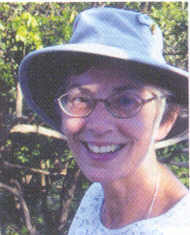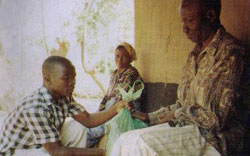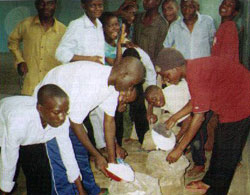
When I was hungry ...
Students at St. Patrick's Seminary High School take action against food shortages within their community
By Barbara Michie
October/November 2006
Return to Table of Contents
Print Article
Often a motto is something we aim for but rarely attain. At St. Patrick's Seminary, a secondary school in Rumphi, Malawi, the motto is, "It is better to give than to receive." It is a difficult motto in this region, in the face of many hardships. Yet, I have been touched by the example of generosity shown by some of our students. They belong to our Young Christian Students group, which emphasizes the See, Judge and Act method.


Members of the Young Christian Students group of St. Patrick's Seminary bag and distribute maize flour to people affected by food shortages in their communities. Mzuzu, Malawi.
At their meetings, after prayer and energetic singing, they discuss a Scripture passage or a problem in their surroundings in the light of Jesus' teaching and example. The students consider the possibilities and make a plan of action. This may be a personal change or an action to benefit others.
As staff advisor to the group, I suggest they consider the problem of food shortages then beginning to affect the poorer people in the community. Although the students sometimes complain about the food at school, they decided that they were relatively well fed and wanted to do what they could to assist some of their neighbours in need.
Since the student group's treasury held the equivalent of only a couple of dollars, the first step was to raise money. Although they already do manual work to help upkeep the school grounds, the students decided to do more work in their free time. The group leaders took the initiative, arranging for paid work with the school bursar and some teachers. Then they got a list of the most needy families in the area from the primary school headmaster and got busy. Near the end of the school term they bought maize with their earnings, had it milled into flour, and then packaged the flour into ten kilogram bags for distribution.
On the last Sunday afternoon before exams, we followed the headmaster on a two-hour visitation. With some flour bags in a wheelbarrow and others carried on heads or shoulders, the boys hauled the bags up and down hills and across gullies to various homes. At each visit there were handshakes all around, a prayer and an exchange of short speeches. The gifts were offered and accepted graciously.
We met a widow trying to raise five young children and a number of elderly grandparents struggling to care for their orphaned grandchildren. They spoke of trusting God in their hardships and challenged the students to continue doing good work.
As we walked home, hot and thirsty, I thought about the people we had met and the enthusiasm the boys had shown in carrying out the project. I felt blessed to have been part of this experience and to have witnessed the students living out their motto.
Return to Table of Contents
Print Article